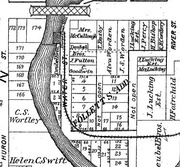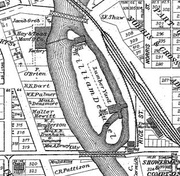Flour mills being among the most basic needs of a new settlement, Ypsilanti's pioneers founded a number of them, small and large, over the years. In 1888, Chapman noted that, "Looking back over a period of 55 years, one is forcibly reminded of the energy which characterized the early mill-builders." (pg.1127) Mills called out by Chapman include,
- Woodruff's Flour Mill - Constructed in 1824-1825 south of Ypsilanti by Major Benjamin Woodruff. Operated until 1830. "Mr. Stephens" was the first miller, and William Wilson provided the grist. Powered by natural fall of 11 feet, no dam required.
- Hardy & Reading's Saw Mill and Flouring Mill - The first mill-dam in Ypsilanti was that of Hardy & Reading, built in 1827 at the corner of French Claim 691 and the southwest quarter of section 4 of Ypsilanti Township. The dam, made of brush, clay and logs, "would appear to be the work of the beaver tribe, instead of enterprising men." The dam washed away in the flood of 1832, with the woolen mill's dam located at that point later. While the mill first built at this site was a saw mill, Hardy & Reading built a flouring mill as well nearby in 1828; that mill burned in 1851.
 The intersection of Water Street and Michigan Avenue hosted a flour mill from 1829 until at least 1895.
The intersection of Water Street and Michigan Avenue hosted a flour mill from 1829 until at least 1895.- Harwood's Flouring Mill - Ypsilanti's third flouring mill was constructed in 1829, by W.W. Harwood, just south of Congress Street, on the left bank of the Huron. Mark Norris assisted Harwood in the construction of the dam for that mill, selling his interest to Harwood in 1832. Later owners included John Gilbert, 1835; Abel Godard, half-share in 1839; additionally in 1839, Gilbert and Godard purchased the water power from the western end of this dam from Major Abram Larzarele; 1840, entire interest to Alfred A. Hunter; later, "Mr. Beckwith" (Cyrus Beckwith, of Sylvan Township?); Nathan Follett & Alexander Ross, 1854; Follett alone, 1858-9; Isaac N. Conklin, 1861; Benjamin Follett, 1862; Nathan Follett, 1865; Messrs. Deubel Bros., 1873. (The Deubel Bros. are likely the same Deubels who owned the Swift Deubel & Co. mill in Ann Arbor in 1872.) By 1888, the Deubel Bros. had changed the name to the Huron Flouring Mill. In 1888, this "modern" mill had "six run of stone, turbine water wheels, and all modern improvements", producing 15,000 barrels of flour annually for the Detroit and Eastern markets, and grinding another 24,000 bushels of grain for local patrons. Valued at $20,000 in 1888.
 The 1895 atlas of Ypsilanti showing the City Mill flouring mill to the northeast of the Cross Street bridge.
The 1895 atlas of Ypsilanti showing the City Mill flouring mill to the northeast of the Cross Street bridge.- Eagle Flouring Mill - In 1839-1840, Arden H. Ballard purchased the site of Hardy & Reading's Saw Mill, along with water rights, and constructed a flour mill at that location. Later owners of this mill included Dr. Clarke of Detroit, 1843; Thomas O. Hill, 1848; Mark Norris and Benjamin Follett, 1850; and Lyman D. Norris and Chauncey Joslin, 1853. In January of 1856, Joslin bought out Norris, becoming the sole proprietor of the Eagle Mill, as well as the Ypsilanti Flouring Mill. In October of 1856, the Eagle Mill burned, apparently after a shipping mishap by the Michigan Central Railroad delivered a 30 day backlog worth of grist to the mill in only 3 days. The fire cost Joslin over $10,000.
- Ypsilanti Flouring Mill - Built in 1839-40 by Mark Norris - possibly at the opposite end of the dam used by Eagle?
- AEtna Mills - At some point in the 1840s, Timothy Showerman purchased Hurd & Sage's Iron Foundry and converted it into a flouring mill. Hurd & Sage had leased a quantity of water power from Mark Norris, but Showerman utilized additional power, resulting in legal proceedings and the stoppage of AEtna. As a result, the mill came to be owned by Norris & Joslin, who converted it into a sash, door, and blind factory, later adding a planing mill, ax-handle factory, and gypsum mill, before the floods of June of 1858 washed the entire operation downstream, at a loss of $12,000.
- Ypsilanti Distillery - a mill initially constructed in 1826 as a distillery was converted by Ballard and Edmunds into a distillery and flouring mill in 1845. In 1849, Ballard sold his interest to James N. Edmunds and Newton Edmunds, who later retired from flouring; by 1888 the mill was an ashery.
- City Mill - another "modern" mill in 1888, on the east bank of the Huron on the north side of Cross Street. An older mill, by 1888 the mill was owned by the Deubel Bros, with new machinery installed by Quirk, Daw & Co.; a siding from the Michigan Central Railroad extended to the building.. At that time, the mill produced 100,000 barrels of flour annually, plus 30,000 bushels of local milling. Valued at $50,000.
Sources
- Chapman, pgs. 1127-1132.


